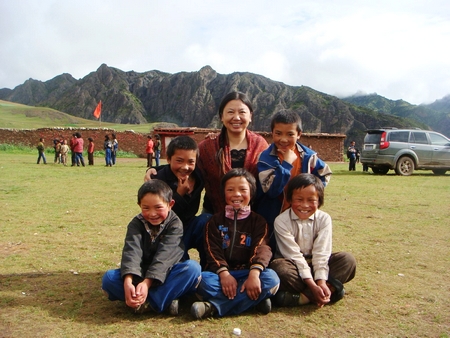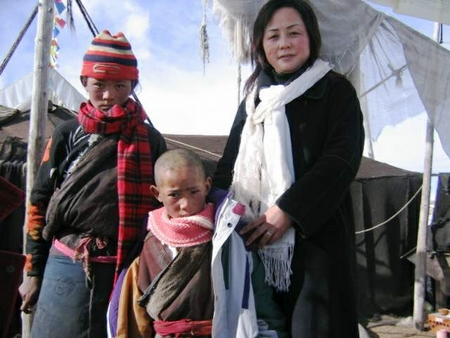 |
Large Medium Small |
Long before the earthquake, a group of people were braving the perilous journey to Yushu to help provide education for the local children. Zhang Yue reports
Yushu, a place hardly known by most people in China before the 7.1 magnitude earthquake on April 14, 2010, drew large numbers of volunteers and rescue workers to the area after the disaster.
Many of them, visiting Yushu for the first time, have vivid memories of the rough road conditions and wretched weather in the area, which caused major difficulties for the rescue and reconstruction efforts after the quake.
But long before the earthquake, a group of people were visiting Yushu, the source of three of China's major rivers (the Yellow River, the Yangtze River and the Lancang River) several times a year to provide help to the local people.
Gesanghua.org, a nation-wide non-governmental organization that strives to improve living conditions and help children living in poverty-stricken areas in west China, has attracted hundreds of volunteers around the country since its establishment in 2005.
Over the past six years, the organization has helped more than 18,000 children in the Qinghai-Tibetan Plateau to receive compulsory education through its One-to-One project, which means one donor helps one student.
"We name ourselves Gesanghua (Dasiphora fruticosa) because it is known as the most beautiful flower on the Qinghai-Tibetan Plateau. We hope that with our commitment, the future of the children living in the area will be as bright as the flower," says 46-year-old Hong Bo, founder of Gesanghua.org.

Hong Bo, founder of Gesanghua.org, with children in Nanqian county, Yushu, Qinghai province in 2009. Photos provided to China Daily |

Zhang Yali with children in Chengduo county, Yushu. Zhang, a former volunteer for Gesanghua.org, lost her life in a traffic accident on her way back from Yushu in June. |
Hong was initially drawn to the Qinghai-Tibetan Plateau by a desire to see the amazing scenery, but a life-threatening experience opened her eyes to the harsh lives of the local people and made her determined to help them.
"I was totally intimidated by a flood and mud-rock flow on my first visit to Yushu in 2004. I was trapped in the heavy flood and could not move. It was an old Tibetan man in a jeep that saved my life," recalls Hong.
She later learned that the flood and mudflow was a comparatively mild one for that area. The road connecting the villages in Yushu with the outside world was a lonely and hazardous one.
Even now, Gesanghua.org visits are still risky propositions as potential danger accompanies a journey such as this.
More than a month ago, while most families in China were celebrating the country's traditional Dragon Boat Festival, Hong learned that Zhang Yali, a former volunteer for Gesanghua.org, lost her life following a traffic accident on her way back from Yushu on the snowy afternoon of June 11.
Zhang, a mother of a 20-year-old son and a 14-year-old daughter, started her connection with children living in Yushu in 2005 and later joined Gesanghua.org.
During that time, Zhang was mainly responsible for visiting children who dropped out of school in poverty-stricken villages on the plateau and trying to find ways in which she and her colleagues could help.
Though she hadn't been a volunteer for Gesanghua.org since 2007, working for similar organizations and caring about children in the plateau remained a major part of her life.
"Most of the kids we knew could not afford school tuition or their families do not see any point in sending them to school," says Hong. "Zhang learned about the children's situation on the Internet and volunteered to help two boys finish high school."
Zhang and her husband Zhang Zhongxiang opened a small bookstore that sells schoolbooks to local primary and middle schools in 2001.
Zhang first went to Yushu in the winter of 2005 when the city's Chengduo county was devastated by a severe snow storm.
Zhiming Longzhu, principal of Chengduo High School, who used to buy books for his students from Zhang's bookstore, told her about the situation in a phone call and asked for help.
"What we know was that almost all the grassland and houses were covered by heavy snow. Sheep and cows were starving to death, as there was no grass to graze on, and people were burning anything they could think of to keep warm because otherwise they were likely to die of frost," recalled Zhang's husband.
Zhang immediately posted the situation on the website of Gesanghua.org.
After collecting four trucks of heavy clothes, beddings and fried noodles in only a week, Zhang was among the first to arrive at the disaster area in Yushu.
Zhang's husband said that he was overwhelmed with concern and fear only after his wife returned from Yushu with Yang Shoude, a reporter from Xinhua News Agency and they showed him photographs they had taken on their way back.
"It was hard to imagine how they made it through," says Zhang's husband. "In some parts, there was no road at all. All you could see was white heavy snow. The Lancang River runs right under the cliff."
Zhang was the second member of the organization to die on the road to the plateau.
The organization suffered the loss of another volunteer in 2008, when Xiong Ning, a 29-year-old female volunteer lost her life on the way to Yushu, also in a traffic accident.
Hong insists on visiting the area herself whenever possible.
"I have become quite familiar with the climate and landscape there. Every time a volunteer heads there without me, I am deeply concerned about their safety," says Hong.
From Xining to Yushu, passing the Bayan Har Mountains, in which every mountain pass is higher than 5,000 meters, is a must for every visitor.
"We have an average of 100 volunteers working for us every year. For them, volunteering is a rewarding experience," says Hong. "While we are eager to help the children, we have made it a rule that safety comes first every time we visit the area. However, we still to have to put our fate at the mercy of nature."
But Hong says the organization continues to send volunteers to the area, rather than just sending money and goods.
"A huge language difficulty exists between us, as many people in Gesanghua.org do not speak the Tibetan language. We find it a big problem that many Tibetan parents do not fully realize the necessity of education," says Hong. "This is why we insist on visiting the area every year."
While the lack of financial support has been a common reason why some children do not receive necessary education at school age, Hong finds their biggest difficulty lies in the personal involvement with people in the plateau.
"Helping children in the area is no easy task," says Hong. "Besides collecting financial and material contributions, constant communication with the children in the area is an important part of our work."
At the memorial for Zhang Yali on July 17, which was attended by hundreds of Gesanghua.org volunteers and local students, a 15-year-old girl walked into the hall with walking sticks and kneeled down before Zhang's portrait.
The girl, named Zhuoma, was severely disabled with her legs crossed when Zhang first met her in Yushu in 2005. The girl dropped out from school and could not afford medication.
Learning about the girl's plight, Zhang immediately took the girl to the Xining Armed Forces Hospital, where medical treatment is much better than in the girl's hometown. After successful surgery, the girl can now walk by herself and she is a student in No1 Middle School in Ledu county, Qinghai province.
Good news keeps coming, Gesanghua.org was recently chosen by China's Foundation of Poverty Alleviation to conduct the Package of Love Project in two counties in Yushu. This is a post-quake construction program that provides schoolbags, books and stationary to students. The Foundation has guaranteed 2 million yuan for the project.
"Ways to help poor people living on the plateau are improving," says Hong. "And we are confident that our future work will be more efficient with increasing help from the society."